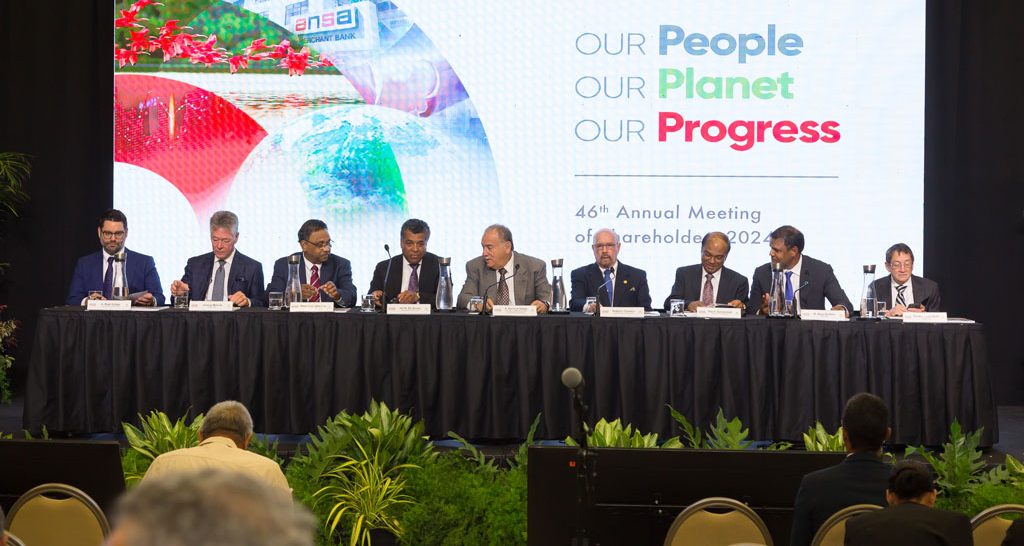


Dr. Anthony N. Sabga – Chairman Emeritus of the ANSA McAL Group of Companies (second from left) presents three Laureates with $500K prizes at NAPA Auditorium on Saturday 05th May, 2012. The Laureates (from left) are Leonard O’Garro from St Vincent – Senior International Consultant/Adviser to UWI on Biosafety/Biotechnology, George Simon – Visual Artist and Archaeologist and Member of the Guyanese First People’s Nation, the Lokono and Paula Lucie-Smith – Founder and CEO of Adult Literacy Tutors Association (Alta) in T&T.
At the fifth prize-giving ceremony of the Anthony N. Sabga Caribbean Awards for Excellence on May 5th, 2012 at the National Academy for the Performing Arts, Michael Mansoor revealed that as of 2012, $7.5 million had been disbursed to 16 laureates in six years. Their fields of endeavour included science, the environment, children’s activism, and literary and visual arts. The criteria used for selecting the laureates, said Mansoor—chairman of the awards’ selection committee, the Eminent Persons Panel (EPP)—included “creating, innovating and making important things happen with genius, enlightened thinking, and leadership.” This is an ambitious definition, but the half-million-dollar prizes and the regional mandate is the first and only such initiative to be undertaken in the Caribbean. Funded by the ANSA McAL Foundation, the awards’ patron is Dr Anthony N Sabga, chairman emeritus of the ANSA McAL Group. The initial idea came from Wilfrid Naimool, who sat on the foundation’s board in 2000 when Sabga retired as chairman of the ANSA McAL Group. Sabga took the idea to various people who refined it.
In 2005, the Caribbean Awards for Excellence initiative was launched. The first laureates were named in 2006 at a ceremony in Port-of-Spain and given prizes for science and technology, arts and letters, and public and civic contributions. Search panels (country-nominating committees) had been established regionally in Jamaica, Barbados, the Organisation of Eastern Caribbean States, and Guyana. Once each territory had its nominees, the 15 were presented to the EPP, which selected the three best.
The first chair of the EPP was the late Sir Ellis Clarke, and the awards were initially biennial. It became annual as of 2010. The move to a yearly cycle, according to Sabga, is because the awards are an investment in the future, and every other year was too slow a rate to introduce desperately-needed innovators and achievers to the region. “What concerns us,” he said, addressing the 2010 ceremony, “is the lives our children and grandchildren will lead. Where they will live. What sources of energy they will use.”
This year’s laureates illustrate the multifaceted nature of enterprise. They are Trinidadian Paula Lucie-Smith, founder of the Adult Literacy Tutors’ Association (ALTA); George Simon, a Guyanese archaeologist and painter; and Prof Leonard O’Garro, a Vincentian plant pathologist and geneticist. Lucie-Smith, in her acceptance speech, provided the statistic that 200,000 people needed ALTA’s intervention—that is, were illiterate—but given its limitations, they could only reach 2,000 people a year. Yet, Lucie-Smith said, the Government “boasts literacy rates in the high 90 (per cent)” and designs policies accordingly. The award has given Lucie-Smith a platform from which to shake the unresponsive establishment. Guyanese archaeologist, George Simon, another 2012 laureate, has made an archaeological discovery in Guyana which changes conceptions of civilisation in this part of the world. His discovery is a series of agricultural mounds, replete with pottery and organic material, stretching a hundred miles, which pushes the date of complex civilisations in the region to thousands of years in the pre-Christian era.
And the platform provided by the awards can also work in the other direction: to apprise the population of programmes initiated by the establishment. In contrast to his co-laureates, O’Garro is already an establishment figure. His work at the University of the West Indies (UWI) has helped the development of disease resistant crops and increasing yields regionally. He also worked with the United Nations and was selected by UWI to be its senior international consultant on biotechnology and biosafety. Within days of his award, a Trinidad farming non-governmental organisation had called him, requesting his guidance to spread the message throughout T&T.
The Caribbean Awards can be found at: www.ansacaribbeanawards.com, and on Facebook, and YouTube channel.
Trinidad Guardian
May 10, 2012













